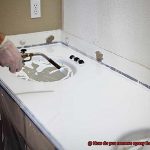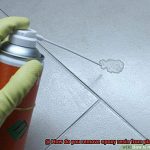Imagine this: You’ve just completed an epic DIY project that you’ve been working on for weeks. Everything looks great, except for one little problem: the overpowering and nauseating smell of epoxy. It’s so strong that you can’t even stand to be in the same room as your masterpiece. Don’t worry, we’ve all been there.
In this blog post, we’re going to give you the lowdown on how to neutralize that pesky epoxy odor. We know how frustrating it is to have a stinky workspace, and we want to help you get rid of it once and for all. We’ll start by explaining what causes epoxy odor and why it’s important to eliminate it as soon as possible.
Next up, we’ll dive into some natural solutions that will help you say goodbye to that unpleasant smell. We’ll cover tried-and-true methods like using vinegar, lemon juice, and baking soda, as well as some lesser-known techniques like air purifiers and ventilation systems.
By the time you finish reading this post, you’ll be equipped with all the knowledge and tools necessary to banish that epoxy smell from your life forever. So sit back, relax, and let’s get started.
Activated Charcoal: A Natural Odor Absorber
Contents
- 1 Activated Charcoal: A Natural Odor Absorber
- 2 Baking Soda: A Natural Deodorizer
- 3 Vinegar: Breaking Down the Chemicals in Epoxy Glue
- 4 Essential Oils: Masking the Epoxy Smell
- 5 Other Ways to Neutralize the Epoxy Smell
- 6 How to Choose an Effective Solution for Neutralizing Epoxy Smell
- 7 Pros and Cons of Using Different Solutions to Neutralize the Epoxy Smell
- 8 Tips for Reducing the Impact of Epoxy Smell
- 9 Conclusion
Well, fret not as activated charcoal is a natural odor absorber that can help to eliminate the unwanted smell of epoxy glue.
Activated charcoal has been used for centuries as a natural purifier for both air and water. It works by trapping impurities in its highly porous surface area, making it an effective solution for neutralizing the smell of epoxy. The large surface area of activated charcoal absorbs odor molecules immediately, leaving your space smelling fresh and clean.
To use activated charcoal, simply place a few pieces in a bowl or container near the epoxy glue and let it work its magic. You can choose from small sachets or larger bags depending on the size of the area you need to treat. While the activated charcoal starts to absorb the odor molecules immediately, it may take several hours or even days to completely eliminate the smell of epoxy. However, it is worth the wait as it is a safe and non-toxic option that does not release harmful gases or chemicals into the air.
Moreover, activated charcoal is not only limited to its odor-absorbing properties, but it also has other benefits such as improving indoor air quality by removing pollutants and allergens from the air. It’s no surprise that activated charcoal is a popular ingredient in many health and beauty products for its detoxifying properties.
Baking Soda: A Natural Deodorizer
There’s a natural solution that’s been around for decades – baking soda. Let me share with you how baking soda can be used as a natural deodorizer for epoxy.

Baking soda, also known as sodium bicarbonate, is a white, powdery substance commonly used in baking as a leavening agent. But it has many practical uses around the house, including as a natural deodorizer and cleaning agent. It’s safe, effective, versatile, and readily available in most households and grocery stores.
To use baking soda as a deodorizer for epoxy, simply sprinkle a generous amount over the affected area or mix it with water to create a paste that you can apply directly on the surface. Leave it on for a few hours or overnight to allow it to absorb the odor before wiping it off with a damp cloth. And voila. The strong odor of epoxy has been neutralized.
But wait. There’s more. Baking soda is not only an excellent deodorizer but also an all-purpose cleaner. It can help remove stains and grime from various surfaces such as countertops, floors, and walls. And when mixed with vinegar, it creates a powerful cleaning solution that can effectively dissolve dirt and grease.
And the best part? Baking soda is an eco-friendly option that’s non-toxic and safe to use around children and pets. You don’t have to worry about harsh chemicals or harmful fumes.
Vinegar: Breaking Down the Chemicals in Epoxy Glue
There is a simple, household solution that can help neutralize the odor – vinegar. As an expert in the field, I’m here to enlighten you on how vinegar can be used to break down the chemicals in this adhesive wonder.
Firstly, let’s understand what epoxy glue is made up of. It consists of two parts – a resin and a hardener. When these two components are combined, they create a strong and durable bond that is resistant to water and heat. However, the downside of using epoxy glue is its potent and pungent smell.
Enter vinegar. Vinegar is an acidic solution that can effectively break down the chemicals in the epoxy glue. When vinegar is applied to surfaces that have been glued with epoxy, it reacts with the resin and hardener to create a chemical reaction that breaks down the adhesive bond.
To use vinegar for neutralizing epoxy smells, mix equal parts of vinegar and water in a spray bottle. Spray the solution onto the surface where the epoxy has been applied and let it sit for a few minutes. Then wipe the surface clean with a damp cloth. Repeat this process until the odor disappears completely.
It’s important to note that vinegar may not be effective in removing all types of epoxy smells. Some types of epoxies may have stronger odors than others, requiring specialized cleaners or solvents to eliminate the smell entirely. Moreover, vinegar may not be suitable for use on all surfaces, as it can cause damage to certain materials like marble or granite.
Essential Oils: Masking the Epoxy Smell
Fear not, as there is a natural solution that can mask the smell and create a more pleasant environment. Enter essential oils – the aromatic and therapeutic extracts from plants that have been used for centuries to improve health and wellbeing. Not only are they an effective alternative to chemical-based air fresheners, but they are also safe and eco-friendly.
Peppermint oil is undoubtedly one of the best essential oils for masking the epoxy smell. Its refreshing and uplifting scent can help to clear the air and neutralize odors, making it perfect for combatting the pungent smell of epoxy glue. Lemon oil is another great option, with its fresh and clean aroma that can help to eliminate unpleasant smells.
But how do essential oils work to mask epoxy smell? There are several ways to enjoy the benefits of these oils. You can add a few drops of your preferred oil to a diffuser or oil burner, which will release the scent into the air and create a relaxing and refreshing atmosphere. Alternatively, you can mix a few drops of the oil with water in a spray bottle and spray it around the room for a quick fix. This will help to neutralize odors and create a more pleasant environment. You can also add a few drops of the oil to a cotton ball or tissue and place it in the room for a more subtle effect.
It’s crucial to remember that essential oils should be used safely and with caution. They should never be applied directly to the skin or ingested, and they should always be diluted before use. Additionally, if you have pets or children, be careful when using essential oils around them.
Other Ways to Neutralize the Epoxy Smell
If you’re looking for ways to neutralize the strong and pungent smell of epoxy, there are several other methods you can try aside from the common household items like baking soda, vinegar, and activated charcoal. Here are five more effective ways to eliminate the odor and enjoy a fresh and clean-smelling space:
Air Purifiers
Air purifiers are an excellent investment for eliminating the epoxy smell. They work by circulating air through a filter that traps and removes airborne particles, including the odor-causing molecules. An air purifier with activated carbon filters is especially effective in removing the smell of epoxy.
Fans
One simple yet effective way to reduce the concentration of the epoxy smell is by using a fan to increase ventilation in the room. This will help circulate the air and dissipate any lingering odors.
Dehumidifiers
Excess moisture in the air can contribute to a strong epoxy smell. A dehumidifier can help remove this moisture and reduce the concentration of the odor. This method is especially useful if you live in a humid environment.
Outdoor Space
If you have access to an outdoor area, consider placing epoxy-coated items outside for a few days to air out. This will allow fresh air to circulate around them and dissipate any lingering odors. Be sure to cover them and keep them away from direct sunlight or moisture.
Essential Oils and Candles
Essential oils like lavender, peppermint, or lemon have strong scents that can mask the unpleasant smell of epoxy. You can add a few drops of your preferred essential oil to a diffuser or mix it with water in a spray bottle and spray it over the affected area. Alternatively, scented candles can also help mask the odor and create a more pleasant atmosphere in your space.
How to Choose an Effective Solution for Neutralizing Epoxy Smell
There are various ways to neutralize the smell and reduce its impact. Here are five effective solutions that you can use to get rid of the unpleasant odor.
Identify the Cause of the Smell
The first step in choosing an effective solution is to identify the cause of the strong odor. If the smell is coming from fresh epoxy, then a different solution may be needed than if it’s coming from old, cured epoxy. This will help you determine which method or product will work best for your specific situation.
Activated Charcoal or Carbon Filters
Activated charcoal or carbon filters are excellent options for neutralizing the smell of fresh epoxy. These products work by absorbing the odors and trapping them in the filter. They can be placed in the area where the epoxy was applied or in a nearby room with good ventilation. With their natural ability to absorb odors, activated charcoal and carbon filters can effectively neutralize epoxy smells.
Commercial Odor Neutralizers
Another solution for fresh epoxy smells is to use a commercial odor neutralizer specifically designed for epoxy fumes. These products are widely available at hardware or home improvement stores and can be sprayed directly onto affected surfaces or into the air. They often contain natural ingredients that can effectively neutralize odors without causing any harm to your health or environment.
Solvent-Based Cleaners or Degreasers
For old, cured epoxy smells, a different approach may be necessary. One option is to use a solvent-based cleaner or degreaser to remove any remaining epoxy residue that may be causing the odor. It’s crucial to use these products in well-ventilated areas and with proper protective gear as they contain harmful chemicals that can cause respiratory problems.
Bleach and Water Solution
Another option for old epoxy smells is to use a bleach and water solution to clean surfaces. This can be effective in removing any remaining residue and neutralizing the odor. However, it’s important to test this solution on a small, inconspicuous area first to ensure that it won’t damage the surface. Additionally, be careful when handling bleach as it can cause skin irritation and other health problems.
Preventative Measures
Lastly, taking preventative measures can help minimize epoxy smell in the first place. This includes working in a well-ventilated area, wearing proper protective gear, and following proper mixing and application procedures according to the manufacturer’s instructions. These measures can significantly reduce the amount of odor generated from epoxy applications.
Pros and Cons of Using Different Solutions to Neutralize the Epoxy Smell
Fortunately, there are various solutions available to neutralize the smell. However, choosing the right solution can be tricky. As an expert in this field, I’ve done some research for you. Let’s explore the pros and cons of the most common solutions used to neutralize the epoxy smell.
First and foremost, air purifiers are a top choice for removing the epoxy smell from the air. They work by filtering out airborne particles, including epoxy fumes. The downside is that they can be pricey and their effectiveness may vary depending on the size and strength of the purifier.
Another popular solution is activated charcoal, which absorbs the fumes and traps them in its pores. Although effective, it may take longer to work than other solutions and requires regular replacement.
For those who prefer natural solutions, vinegar is a great option as it breaks down fumes and eliminates them from the air. However, it can be overpowering and leave a strong vinegar odor behind. On the other hand, baking soda is another natural solution that can absorb and neutralize epoxy fumes. It’s inexpensive and readily available in most households, but may not be as effective as other options and requires frequent replacement.
Lastly, chemical neutralizers are designed to quickly and effectively neutralize epoxy smells, making them ideal for industrial settings where large amounts of epoxy are used regularly. However, they can be costly and require special handling.
Tips for Reducing the Impact of Epoxy Smell
Epoxy glue is a powerful adhesive commonly used in DIY projects. However, its strong odor can be overwhelming and uncomfortable. To reduce the impact of epoxy smell in your workspace, consider the following tips:
Proper Ventilation
The first and most crucial step is to open all doors and windows to allow fresh air to circulate throughout the area. You can also use a fan or air purifier to speed up the process of expelling the fumes. This will help in expelling the fumes and making the workspace more comfortable.
Use Protective Gear
Using a respirator mask or other protective gear can help filter out harmful fumes and protect your respiratory system while working with epoxy. A mask with activated carbon filters is highly effective in neutralizing epoxy’s smell. It is essential to wear a mask that fits properly to prevent any gaps that may allow the fumes to enter.
Low-Odor or Odorless Epoxy
Opting for low-odor or odorless epoxy can reduce the intensity of the smell. Ensure you read labels carefully and choose products that are specifically labeled as low-odor or odorless.
Use Natural Odor Absorbers
Activated charcoal, baking soda, and vinegar are natural odor absorbers that can help neutralize any lingering odors in the workspace. Simply place a few pieces of activated charcoal in a bowl or container near the epoxy glue or sprinkle baking soda over the area where it was applied. You can also use vinegar by mixing equal parts water and vinegar in a spray bottle and spraying it over the area where it was applied.
Store Epoxy Materials Properly
Storing epoxy materials in airtight containers can prevent any fumes from escaping and spreading throughout the workspace. Label these containers correctly and store them in a cool, dry place away from direct sunlight.
_EUdbyPW4oA” >
Conclusion
To wrap things up, the overpowering scent of epoxy can be a real headache for DIY enthusiasts and professionals alike. But fear not, as there are several natural and effective ways to neutralize this unpleasant odor and create a more comfortable workspace.
Activated charcoal, baking soda, vinegar, essential oils, air purifiers, fans, dehumidifiers, and commercial odor neutralizers are all viable options that can help eliminate the smell of epoxy. However, it’s crucial to consider the cause of the smell and weigh the pros and cons of each method before making a decision.
In addition to using these solutions, taking preventative measures like working in a well-ventilated area with proper protective gear can significantly reduce the impact of epoxy smell. By following these tips and techniques, you’ll be able to tackle your next DIY project with confidence knowing that you have the tools necessary to keep your space smelling fresh and clean.
Say goodbye to that pesky epoxy odor once and for all by implementing these tried-and-true methods.






